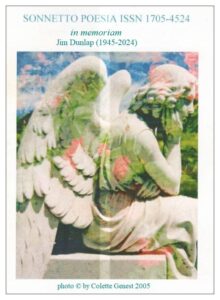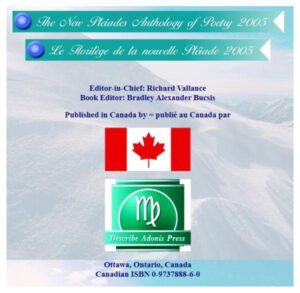A fond farewell to Jim Dunlap (1945-2024)
and celebration of his life, his memorable poetry and sonnets
by Richard Vallance
Jim Dunlap (Jan. 9, 1945 – Dec. 5, 2024), a graduate of the University of Nebraska at Omaha, had his first work published in 1970. Since then his work has appeared in over 90 publications, including allpoetry.com (frequently), The Paris/Atlantic, Potpourri, Candelabrum, Möbius, Poetry Life & Times (UK) and Sonnetto Poesia. He was also the chief proofreader for the On Viewless Wings Anthology, published out of Queensland, Australia. Jim recently published The Spirit of Christmas in Poetry (© 2011 ISBN 9-781-4659-8261-2), available on Kindle. I first encountered Jim Dunlap, when I came across his homepage, Mindful of Poetry, https://mindfulofpoetry.homestead.com, where he frequently raised environmental and human rights concerns. Several of his own sonnets and poems appear on pp. 1-6. 1. Although I have never met Jim face to face, over the years 2004-2024, we cultivated our friendship and our literary experiences through the Internet, primarily via e-mail, while we also often spoke on the phone. Sadly, Jim simply dropped out of sight once and for all time in December 2024. He is sorely missed by his friends and fellow poets alike.
1.Jim Dunlap’s sonnets and poems published in Sonnetto Poesia, ISSN 1705-4524

Fiery Maid of Orleans
She burned … with holy fire,
And gave her all … for God.
Her soul a fiery rod
Divining faith … that higher
Soared, to a sainted realm
To some fair, better place.
In mail and burnished helm,
She ran a deadly race –
And vowed, with shaking breath,
No pain would drag her down.
She died a martyr’s death
To search a golden crown.
Though stake might be her byre,
She burned … with holy fire.
Sonnetto Poesia, Vol. 4, no. 5, summer 2005, pg. 30
Symbols in Flight, 1941
I’d have liked to see the bluebirds fly
Above the white, chalk cliffs of Dover;
And while blithely soaring over,
Immersed in thought I’d lie
In calm repose upon that beach,
Admiring those swooping forms,
In evanescent, fleeting storms,
Like ballet … far beyond my reach.
Frisking, fragile, carefree birds,
Symbolic in intrinsic meaning –
Like liberty and freedom’s words
In English springs, forever greening:
As England fought a bitter fight
To hold at bay the ‘fall of night.’
Sonnetto Poesia, Vol. 4, no. 5, summer 2005, pg. 31
also in
Sonnetto Poesia, Vol. 8, no. 4, autumn 2009, pg. 16
where Jim Dunlap sets the historical background to this sonnet:
Setting, approximately June 1941, Dover Beach, immediately following the Battle of Britain. We are taken to a specific place as well as a specific time, when the world was at war and the fate of all mankind hung in the balance. It is relevant because we are fast approaching another such time. Bluebirds are not found in the British Isles, but I wrote the poem before I became aware of the act. The curator at the Dover Museum said I should just leave it that way, as bluebirds, since the song, The White Cliffs of Dover, specifically named bluebirds.
The sonnet, quasi-Petrarchan, is archived with other writings about Dover and the Second World War by the Dover Museum, in Dover, England.
A Call from the Clouds
A missed phone call, can it redefine life?
It was mid morningish, that fateful day
And I was tired, sleepy, missing my wife.
What a price I’d eventually pay.
The phone rang and rang, I covered my head.
Voice messaging would soon answer the call.
I could barely arise from the clutch of the bed.
And fumbled my way to the john down the hall.
Then I punched the code, put phone to ear,
And almost collapsed from the shock.
Mary’s voice fairly shrieked, full of fear,
As I glanced at the time on the clock.
Goodbye, my darling, we’ll meet in Heaven.
She died 2001,9/11.
Sonnetto Poesia, Vol. 4, no. 4, autumn 2005, pg. 27
Pluck by Lust
Jupiter’s encircling moons,
named for the paramounts of Zeus,
wander in a cosmic dance –
like a beaded hangman’s noose.
The Kingly God of legend
was a lecher, brash and bold –
his affections scattered fiercely,
with each catch forcefully shoaled.
Europa’s name was given
to a continent as well –
while poor unlucky Io
only got a taste of Hell.
But prudes rewrite mythology,
and Ganymede, a shepherd boy,
is ignored, although his visage
rivalled that fair maid of Troy.
Yet the moon that bears his name
may be terraformed someday –
and immortalized, he’ll be, at last,
remembered fondly, young and gay.
He frolicked in Elysian fields,
rolled naked on the sod –
and learned that one should never
tempt the fancy of a God.
Sonnetto Poesia, Vol. 5, no. 4, autumn 2005, pg. 25
A Call to Arms
The die was cast with Earth’s first dawn –
Defend the right in spite of circumstance:
Long ages since, the battle lines were drawn.
In struggle, good and evil meet head-on –
With luck and skill, our ideals will advance.
Long ages since, the battle lines were drawn.
Each battle fought, engaged with brain … or brawn ..
Strength of character and honor will enhance.
Long ages since, the battle lines were drawn.
Each one of us, a player, King … or pawn –
Be alert, don’t sleepwalk in a trance.
The die was cast with Earth’s first dawn.
The board the world … at most a hanger-on –
While some, Evil’s minions will entrance.
Long ages since, the battle lines were drawn.
Weight each choice with care, both pro and con.
The world is fraught with misstep and mischance.
The die was cast with Earth’s first dawn.
Long ages since, the battle lines were drawn.
Sonnetto Poesia, Vol. 6, no. 1, winter 2006, pg. 34
Ariadnes … or Adonis?
A ‘face that launched a thousand ships …’
Such beauty might eclipse the sun.
What God created such a one?
All men would die to kiss those lips.
Of her beauty, wondrous and fair,
For centuries the minstrels sang …
Her fame resounded till it rang
Like an invocation … or a prayer.
What cost does beauty reimburse?
Her radiance all should propound.
Though one searched the Universe,
It seems no fairer could be found:
Not Zeus himself could make more joy
In a goddess … or a shepherd boy.
Dream Flight
I envy wild hawks as they soar
In freedom up the swelling sky –
Music intertwines and swells
And forms a wreath on Heaven’s door.
Cherubs weave unearthly spells
To illuminate the bye and bye.
Like a symphony’s exalted score,
Each rising note takes wing – to fly
While … as the pounding echoes die,
The music of englobing spheres
Limns raindrops, while the Angels cry
Through veils of evanescent tears.
Like eagles, down the fleeting years,
Dreams mount those far, celestial stairs
To cull away life’s doubts and fears.
While aeries serve as darksome lairs
For unsavory truths … disguised
As demons … to be exorcised.
Sonnetto Poesia, Vol. 6, no. 3, winter 2006, pp. 26 & 27
On the edge of the Sundering Sea
Elf towers silhouette a cobalt sky
in the Northern Marshes of the Shire;
and past them, one will find the sea,
and foaming breakers in the lea –
while music echoing from flute and lyre
calls up sharp images … your laugh or cry
and sigh … and homeward turn, as if to flee
a place too bright … and pure … desire
calls softly, and the urge to rest
overpowers all else in hobbit breast,
in awe of Eldamor’s undying West.
Beware, beware, the seagulls call,
unwary Elves may linger there,
and find their very souls in thrall;
so Elvenkind, beware … beware.
Sonnetto Poesia, Vol. 7, no. 2, spring 2008, pg. 34
Millay’s Mystique
She tied her auburn hair in buns …
and wove love stories in her mind.
The world her oyster, she would find
solace in rhythm, rhyme and puns.
Her love affairs … some of them legion,
some said promiscuous, as cupid’s dart
seemed constantly to pierce her heart,
or possibly some nether region.
Yet, living, hewed to her own terms,
while partners multiplied across the years.
She’d never bow to rules … or fears,
as stories tell … history confirms.
To the end, defying death’s cruel knell,
she wove, in words, a magic spell.
Sonnetto Poesia, Vol. 8, no. 3, spring 2008, pg. 30
Embyronic Forebodings
With hair like corn-silk and lazuline eyes,
you lit up my dreams with a radiant smile,
part angel, part demon, part errant surprise,
a bundle of impish seduction and guile –
I still feel your warmth. I clasped in my arms
such joy, evanescent, but glowingly real –
I could feel stirring echoes, latent alarms
of innocence crumbling, a façade puerile –
yet a prescient stirring aroused in my breast
echoes of pain, susurrations in streams
which were instantly trapped and suppressed.
Incipient loss buoyed depressing extremes,
while a surfeit of love was enough
to avert your leaving. Oh God, it was rough.
pg. 86 in: The Phoenix Rising from the Ashes: Anthology of Sonnets of the Eearly Third Millennium = Le Phénix renaissant de ses cendres : Anthologie de sonnets du début du troisième millénaire 2 Victoria, British Columbia, Canada: Friesen Press, © 2013
ISBN 1-4602-1701-6
The Phoenix Rising from the Ashes = Le Phenix Renaissant de Ses Cendres – Anthology of Sonnets of the Early Third Millennium = Anthologie de Sonnets a: Vallance, Editor-In-Chief Richard: 9781460217016: Books – Amazon.ca
Bear Facts – Unplugged
Conventional wisdom aside,
Black bears don’t really hibernate
All winter long – they alternate
Wakefulness and sleep … and bid
Their time till spring at last returns.
But they seldom venture from their dens
(Though it’s instinct alone that pens
Them for these seasonal sojourns.)
Spring finds them truly mean as hell:
They eat roots and pine needles to plug
Their intestinal tracts, so snug
There’s practically no need to tell
The poor things suffer to the last
Second when the plug is passed.
The New Pleiades Anthology of Poetry = Le Florilège de la nouvelle Pléaide
& Plainsongs, spring, 1996
Decoding Reality
Sometimes I want to turn life upside down,
rip it along the perforations until it fragments
on the vivid razor edge of now …
scream defiance in the ghoulish face of death …
and scrawl graffiti in luminescent hieroglyphics
across the very foundation of Eternity.
Sometimes I want to dig through them
and unearth the building blocks of time and space.
Sometimes I just want to laugh, and sing, and cry …
and remember that I’m human.
Sometimes I don’t.
The New Pleiades Anthology of Poetry = Le Florilège de la nouvelle Pléaide
Dream Reminiscences
I’ve marveled much throughout the years
At how our past … relived in dreams …
Recalls old heartaches, steeped in tears,
And happiness of childhood schemes.
How as I toss in restless sleep,
I dream of love … and star-crossed lovers;
And precious moments that I keep;
Things no live being discovers ..
Enshrined within my heart and soul;
I find that friends I’d long forsaken
Come each to play a crucial role,
And reenact the way I’ve taken.
I note that lovers, friends, and kind,
Though to each other, most were strangers,
Throughout my dreams are sprinkled in
And share in ecstasies and dangers.
Yet though they’re gone when I awake,
My heart has calmed and ceased to ache.
The New Pleiades Anthology of Poetry = Le Florilège de la nouvelle Pléaide
Dream International Quarterly, 1992
Drinking form the Poet Laureate’s cup *
Gathering together the loose ends of our lives,
We open doors long sealed inside our hearts,
Dodging fate’s sharp arrow and fierce darts …
Like surgeons honing glinting scalpel knives.
Slicing through the tangled veil of years,
We delve for truth – and sometimes find it –
Though base emotions might still gag and blind it.
Promise beckons beyond doubts and fears.
What does the poet owe to the reader
Which might pay for the death of a tree?
Could beauty alone spark a jubilee
For a towering pine or magnificent cedar?
Whether primly polite, or rude and uncouth,
Verse validation comes mainly through truth.
* Inspired by Phil Wey’s comment at the Des Moines National Poetry Festival when he picked up Robert Pinsky’s cup and took a drink, saying, “What if I drink from the Poet Laureate’s cup”?
Envoi: Adieu. Farewell
And then adieu, – farewell! – the dream is done
(Edna Saint-Vincent Millay)
Hey, are you there? I called you twice today…
and yesterday … I divine you’re not in.
I’m worried sick. I pray, are you O.K?
Your diabetes wears your spirit thin.
Life, why so damn jealous of our last breath?
Your life’s snuffed out? No. What a shouting shame!
Why must I dwell so zealously on death?
I fear life’s a mere flickering flame.
Why must the muses take such a grim toll
on us, unveiling our intensest fears?
Are sonnets second nature to your soul
slicing through the threadbare veils of your tears?
Your sonnets serenade us in your spell, *
annulling death’s knell. Adieu. Farewell.
* adapted from: Millay’s Mystique, by Jim Dunlap
To the end, defying death’s cruel knell,
she wove, in words, a magic spell.
Richard Vallance 2025
References & Notes:
1. The Phoenix Rising from the Ashes: Anthology of Sonnets of the Eearly Third Millennium = Le Phénix renaissant de ses cendres : Anthologie de sonnets du début du troisième millénaire. pg. 228
2. The Phoenix Rising from the Ashes: Anthology of Sonnets of the Eearly Third Millennium = Le Phénix renaissant de ses cendres : Anthologie de sonnets du début du troisième millénaire 2 Victoria, British Columbia, Canada: Friesen Press, © 2013
ISBN 1-4602-1701-6
The Phoenix Rising from the Ashes = Le Phenix Renaissant de Ses Cendres – Anthology of Sonnets of the Early Third Millennium = Anthologie de Sonnets a: Vallance, Editor-In-Chief Richard: 9781460217016: Books – Amazon.ca
3. The New Pleiades Anthology of Poetry = Le Florilège de la nouvelle Pléaide

© by Richard Vallance 2025
https://www.artvilla.com/in-memoriam-jim-…richard-vallance/




